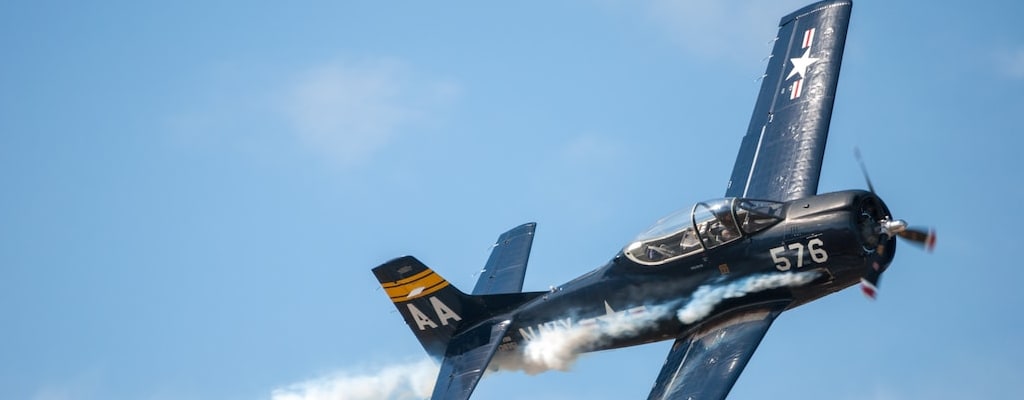deadstick landing: Idiom Meaning and Origin
What does ‘deadstick landing’ mean?
A "deadstick landing" refers to a situation in aviation where a pilot successfully lands an airplane without any engine power. The term suggests a high level of skill and resourcefulness required to safely bring the aircraft to the ground without power.

Idiom Explorer
The idiom "land on one's feet" means to recover or be successful after a difficult or challenging situation. It suggests being able to adapt and find a positive outcome despite the circumstances.
In idiomatic usage, the phrase "landing strip" typically refers to a narrow strip of pubic hair left in a specific shape for aesthetic purposes prior to intimate activities.
An idiom frequently seen in English, "holding pattern," refers to a state of temporary inactivity or delay, where one is waiting for a decision, action, or event to occur. It often implies a sense of frustration or impatience during the waiting period.
The idiom "hit the ground running" means to start a project or task quickly and energetically, without wasting any time. It indicates a proactive and effective approach to getting things done.
"High and dry" is an idiom that means to be left in a difficult or helpless situation, especially without any assistance or support.
'Happy landings' is an idiomatic expression commonly used to wish someone a safe and successful journey or venture, particularly when they are about to embark on something uncertain or risky.
The idiom "fly off" means to leave or depart quickly, often with great speed or urgency.
The idiom "fly by the seat of one's pants" means to act or make decisions without a plan or knowledge, relying on intuition or improvisation. It originates from aviation, where pilots had to rely on their senses rather than instruments.
The idiom "draw stumps" means to end or finish an activity or an event abruptly.
Demystifying Deadstick
The idiom "deadstick landing" refers to a specific situation in aviation where an aircraft has lost all engine power and is forced to make an emergency landing without any power source. This term is often used by pilots and aviation enthusiasts to describe a challenging and dangerous scenario that requires skill and precision.
In a deadstick landing, the pilot must rely solely on the aircraft's remaining momentum and their skill in handling the controls to guide the aircraft to a safe landing. There is no power to the engines, resulting in a silent and powerless descent. The pilot's ability to assess the situation, make quick decisions, and safely maneuver the aircraft is crucial in this scenario.
The origin of the idiom can be traced back to the early days of aviation when engine failures were more common due to the lack of reliability and technological advancements. The term "deadstick" refers to the condition of the throttle or control being at its lowest position, resembling a lifeless stick or control column.
Deadstick landings require a high level of skill and experience from the pilot. They must rely solely on their training and instincts to control the descent and safely bring the aircraft to the ground. The lack of power makes it challenging to control the speed, altitude, and direction of the aircraft, further adding to the difficulty of the situation.
These emergency landings can occur for various reasons, such as fuel exhaustion, mechanical failures, or electrical problems. Regardless of the cause, a deadstick landing demands calmness, swift decision-making, and precise execution from the pilot to minimize the risk of injury or damage to the aircraft.
Overall, the idiom "deadstick landing" encapsulates the high-stakes situation faced by pilots when their aircraft loses all engine power. It represents an emergency scenario that requires the utmost skill and expertise to safely navigate and execute a successful landing. The idiom serves as a reminder of the challenges and risks involved in aviation while highlighting the remarkable capabilities and training of pilots who are capable of handling such situations.
While the idiom provides a clear picture of the specific circumstances it describes, it also serves as a reminder of the broader concepts of adaptability, resilience, and problem-solving. The idea of a deadstick landing extends beyond aviation, serving as a metaphor for unexpected challenges and the need to navigate through difficult situations with resourcefulness and composure.
The idiom "happy landings" is often used by pilots and aviation enthusiasts as a way to wish each other well before takeoff or after a successful landing. It's a lighthearted and friendly expression that acknowledges the uncertainties and risks involved in aviation while conveying good wishes and positive energy. In the context of a deadstick landing, the idiom "happy landings" takes on an ironic tone, as this emergency scenario is anything but happy. However, it serves as a reminder of the importance of maintaining a positive outlook and staying optimistic, even in the face of challenging circumstances.
The idiom "dead duck" is a expression used to describe a person, object, or situation that is doomed or in a hopeless position. In the context of a deadstick landing, the idiom "dead duck" can be used to describe the state of an aircraft without engine power. Without any means of propulsion, the aircraft is essentially "dead in the water" or "dead in the sky." The pilot must rely solely on their skills and the remaining momentum of the aircraft to safely navigate and execute a successful landing. The term "dead duck" emphasizes the precariousness of the situation and the challenges the pilot faces in bringing the aircraft to a safe landing.
The idiom "dead air" is often used in broadcasting or radio to describe a period of silence or lack of activity. In the context of a deadstick landing, the idiom "dead air" represents the absence of sound and power that comes with the loss of engine power. The descent becomes silent, with only the wind and other natural noises accompanying the pilot's actions. This silence and lack of power add to the overall difficulty and intensity of the situation, making the pilot's ability to control and safely land the aircraft even more crucial. The idiom "dead air" underscores the unique and challenging nature of a deadstick landing and the heightened focus and concentration required from the pilot.
Example usage
Examples of how the idiom deadstick landing can be used in a sentence:
- The experienced pilot had to perform a deadstick landing after the engine suddenly failed.
- Despite the challenging circumstances, the skillful aviator successfully executed a deadstick landing on the small airstrip.
- During the emergency situation, the pilot remained calm and skillfully executed a deadstick landing to avoid any injuries or damage.
More "Aviation" idioms



